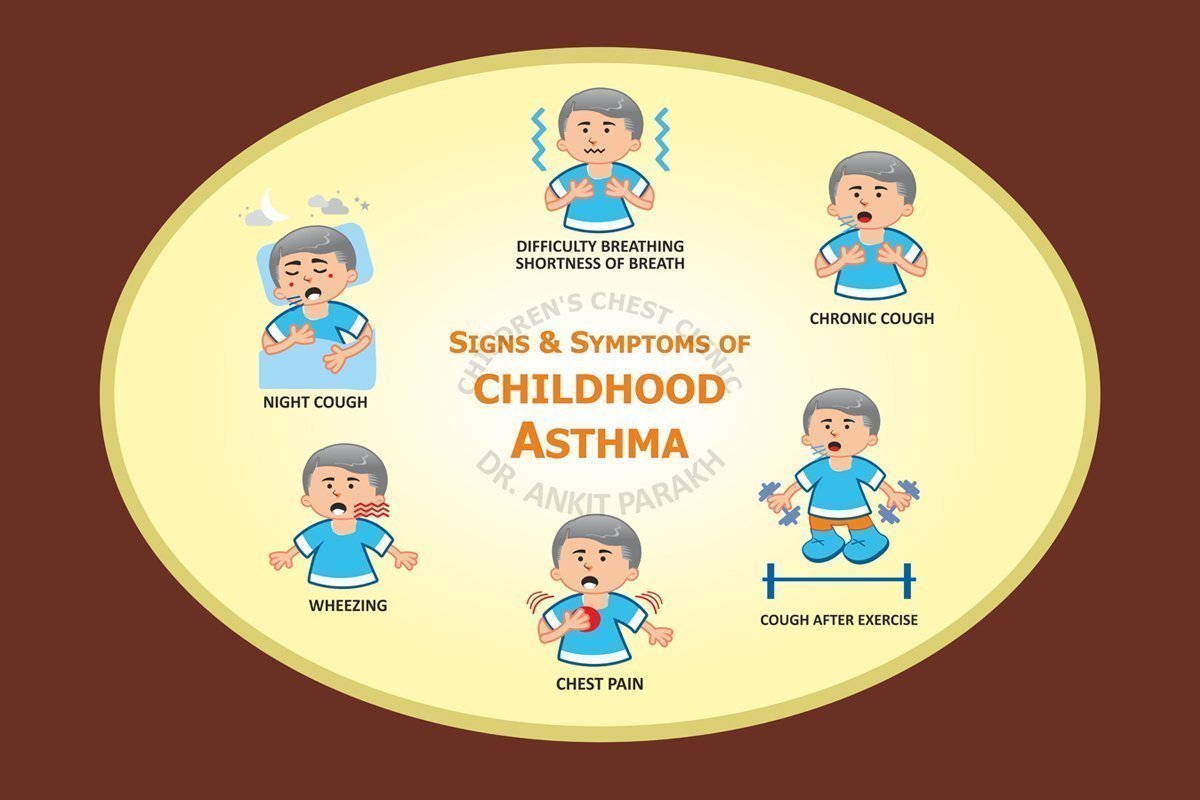
Asthma Symptoms in Children
Common Symptoms of Asthma in Children
Recognizing the symptoms of asthma in children is key to early diagnosis and management. Some of the most common symptoms include:
- Chronic Cough: One of the hallmark symptoms of asthma in children is a persistent cough that is often worse at night or in the early morning.
- Wheezing: Wheezing is a high-pitched whistling sound that occurs when breathing, particularly during exhalation. This happens when the airways are narrowed or blocked, making it difficult for air to flow in and out of the lungs.
- Shortness of Breath: Children with asthma may feel short of breath, especially during physical activities or after exposure to triggers. They may also appear more fatigued than usual.
- Chest Tightness: Asthma can cause a sensation of tightness in the chest, making it feel as though the chest is constricted or restricted.
- Asthma Attacks: During asthma attacks the child gets increased cough, wheezing and breathlessness or difficulty in breathing. These episodes may occur 2-3 times a year to 8-10 times a year. Each episode can last for 5-7 days but can be prolonged upto 3 weeks. In between these episodes children can be absolutely well but some children can have persistent cough especially with exercise or activity.
In most children the above mentioned symptoms are recurrent (happen repeatedly) and may not be present throughout the year. There can be seasonal variations with winters being worse than summers. These episodes can vary in severity, with some children experiencing mild symptoms while others may face more frequent and severe attacks.
The symptoms of asthma tend to get worse with physical activity and on exposure to triggers. Many children with asthma have other allergies like allergic nose, allergic skin or atopic eczema and/or food allergy. A family history of allergy and asthma also supports a diagnosis of asthma.
Symptoms of Asthma in Young children or Toddlers
Most young children get frequent episodes of cough and cold which settle in 5-7 days. In toddlers with asthma, cough tends to persists longer usually for 10-14 days or longer with each viral cold. In addition there would be some symptoms in between these episodes like cough on exercise or jumping or playing. Children can also have a wheezing sound from the chest especially on physical activity. Children might have problems with allergens and irritants like dust, smoke, strong smell like deo’s or perfumes or paints.
Asthma in children is a manageable condition when diagnosed early and treated appropriately. By recognizing the symptoms of asthma parents can help their children lead a healthy and active life. With effective management strategies such as inhalers and trigger avoidance, children with asthma can enjoy a good quality of life.
If your child is showing signs of asthma or if you need guidance on managing asthma symptoms, you need to contact a pediatric pulmonologist.
Conclusion
Frequently Asked Questions (FAQs)
1. What are the common symptoms of asthma in children?
The most common symptoms include chronic cough, wheezing, shortness of breath, chest tightness, and increased mucus production.
2. Do all children with asthma have all the symptoms?
Most children with asthma will have all the symptoms mentioned above but few children can have only one type of symptom. Some children with asthma have a only a persistent but no breathlessness or wheezing, while some have breathlessness on exercise but no cough.
3. Can asthma in children be cured?
While asthma cannot be cured, it can be managed with medication, lifestyle changes, and by avoiding asthma triggers.
4. What is nocturnal Asthma?
Some children and adolescents get symptoms like chest tightness, shortness of breath, cough, and wheezing only at night. These symptoms can be very disturbing and makes sleep impossible.
5. What is exercise induced asthma?
Some children experience symptoms like shortness of breath, wheezing, coughing during or only after vigorous or prolonged exercise. This happens due to a narrowing of the airways in the lungs triggered by strenuous exercise.



